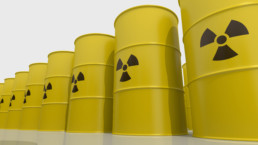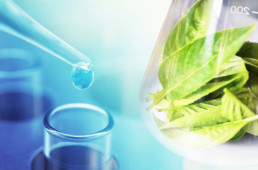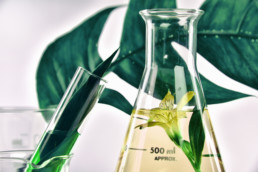Depletion of natural resources. Instability of resource availability and prices. Uncontrolled ecological destruction. Worrying questions of sustainability and public opinion. Unpredictable side-effects of greenhouse gases.
All of the aforementioned problems are obstacles that not only represent risk factors in continuing to depend on fossil fuels, but which have already severely affected global industry in recent decades.
It is at this point in time in which are looking down the proverbial barrel of the fossil fuel gun with few options, yet our planet itself has gifted us a solution: biotechnology, and its sister discipline, biochemistry. A gamechanger with roots leading all the way back to ancient times, this discipline is poised to offer the solutions to problems that have been tormenting our best minds for centuries.
A new age of energy, materials, and chemistry has begun. The time for biotechnology is here.
Biotechnology has always been an option… just not a feasible one
While processes and terms such as transgenics, somatic hybridization, and genome editing may be relatively modern, humanity has actually been on the biotech path for millennia.
Sources often state that it began in the far reaches of Mesopotamia, where bacteria were used to convert wine into vinegar, and soon progressed towards helping the first farmer crossbreed crops for enhanced qualities, such as increased blight resistance and drought tolerance.
Interestingly, it was also a simpler version of biotechnology that drove the processes behind the baking of bread, brewing of beer, and manufacturing of cheese since the early days of our species. Fermentation itself is a process that has evolved from simply being a method of making alcoholic beverages to helping solve the pharmaceutical questions of the twenty-first century, and the same genetic discoveries made by Mendel in the mid-19th Century are what have allowed today’s scientists to save countless lives through vaccines.
However, the processes behind bio-based alternatives have, for many ages, been too complex, costly, or inefficient to use on an industrial level. Many of the chemical agents obtained from biological sources require the cultivation of microorganisms and, before the development of the biotechnological industry in modern times, it was unfeasible to consider these as a true alternative to petroleum derivatives.
In fact, before we began to comprehend the consequences of our reckless abuse of toxic fossil fuels and the products created from them, there was no strong justification to abandon them in hopes of a greener source of raw materials.
Nevertheless, humanity is already clearly making the right steps towards safer manufacturing, and to a safer planet.
Biotechnology in the 20th Century – a scientific revolution
If we want to nail down the exact source of modern biotechnology, we should start by looking at one of the most crucial moments in scientific history: the discovery of DNA. This occurred in 1869, when the Swiss physician Friedrich Miescher studied pus inside surgical bandages. His work led to the creation of Watson and Crick’s double-helix representative model in 1953, and it was only then that we were allowed to take a deeper look into the building blocks of life itself.
With this knowledge, scientists could look beyond the macro of organisms, and now began to study the micro of what made them tick. Where before, they may have been forced to choose between one microorganism (with a specific set of qualities) and another (with a different set), there was now the possibility of editing the very source code within them to enhance or diminish certain characteristics for our benefit.
In other words – we could bend life itself to our will. Yet, splicing genes was only the first step – it was only a matter of time before chemistry, biotechnology and technology would meet in the most spectacular way.
The evolution of biotechnology as a viable petroleum fuel alternative
Humanity has long faced two big obstacles towards stable, consistent population growth and technological advancement – for the former, the safety of guaranteed food supplies, and for the latter, the utilization of efficient, clean energy sources.
Our industries are limited by the second of these obstacles to the point that, disregarding the damage being caused on the environment, many economic or political leaders are capable of ignoring the matter entirely and allowing their factories to contaminate freely without consequence. Whether through the use of petroleum derivatives or other polluting substances, even in present times, many companies are yet to attempt to switch to cleaner alternatives.
Even so, it is no longer a case of these options being non-existent or unfeasible, as they might have been in previous ages, but of the trouble of reinvesting in newer, safer technologies, that puts certain manufacturing giants off.
For a long time, aliphatic alcohol fuels have received important attention from green-minded industrial companies and environmental regulatory bodies alike, both seeking a gradual phase-out of fossil fuels.
Obtained from both synthetic chemical and biological processes, such as fermentation, these bioalcohols – as they are known – are able to power our vehicles and fuel our machinery just as efficiently as gasoline or diesel would, except without the contaminating factors linked to fossil fuels.
Economic factors, such as miles per gallon statistics, are comparable between gasoline and bioalcohols, and their biological origins represent a viable alternative to the costly drilling, extraction, and refining processes of raw crude oil.
Despite certain conglomerates and political authorities wishing to preserve the use of harmful technologies and hazardous substances to avoid the costs of ‘going green’, the reasons to do so are all but running out.
“Petrochemistry has only been as good as the temporary benefits it has brought us - we've known that sooner or later, it has always been a transitory step in human industry.
If we are to create a safer planet that we can live in for millennia, bio-based chemical, fuel, and material alternatives must be developed as soon as possible.”
— Ryan Esner, Environmental Fluids CEO
Moving forward: biotech in material sciences, pharmaceuticals, food, and more
Regardless of whether we’re or not the world is ready to challenge the massive petroleum industry head on, there are other industries that are benefitting from biochemical processes and products, and we are starting to reap the benefits of safer and greener bio-based initiatives.
These are just a few cases of how biotech and biochemistry are helping solve today’s problems:
- In medicine, the science of pharmacogenomics has been developed – a discipline which studies the genotypic makeup of an individual patient’s cells, allowing pharmaceutical specialists and physicians to develop and prescribe medicine in a way that is specific to the patient. The promise of personalized medicine is a real one, which will immensely boost the recovery rates from life-threatening conditions, as well as protect patients from adverse drug reactions.
- Materials sciences have advanced with the help of biochemistry, harnessing the lower cost and reduced toxicity of non-petroleum substances to create stronger composites, more flexible polymers, and safer solvents for household and industrial uses. Pollutant materials, such as petroleum-based plastics, are being phased out for cheap and more efficient biopolymers, which can biodegrade with ease.
- Food producers are quickly rediscovering the benefits of modern biotechnology, after centuries of being familiar with its fundamental techniques: modified crops are now more resistant to drought, herbicides, insects, and viruses, and the food produced from these crops have acquired a much improved quality in taste, color, odors, and is longer lasting than previously. Farmers are now improving the production yield of their crops, and as a result are earning more.
Furthermore, when it comes to animal production, animal health is at an all-time high, with the life expectancy and resistance to diseases among livestock having benefitted from enhanced breeding techniques and more nutritional feed.
- Food packaging is also seeing a huge shift in materials used for protecting fresh products and enhancing their shelf life: there are already bio-based degradable polymers being created from food waste which, unlike plastics, can readily biodegrade and be reused for composting, representing a safe and very green alternative to the traditional, polluting materials used.
- Biosurfactants are starting to take over the surface-active agent market, surpassing both plant-based surfactants (which aren’t as effective or inexpensive) and petroleum-derived surfactants (which are non-biodegradable, and can be highly toxic towards humans and animals). Used extensively in the personal care industry, rhamnolipids are a fantastic example of how biotech is producing better surfactants than ever.
All in all, biotech and biochemistry are influencing industry now in the same way that petrochemistry did a century ago: they are offering a new, interesting, and much more efficient level of products and technology that we had never witnessed previously.
Although it is looking like it may not be the traditional chemical giants that take the first steps into making the world a greener place, companies like Environmental Fluids are happy to be the pioneers into a new age of chemistry that respects the planet and its inhabitants.
We are prepared to tackle each challenge as it comes and will work to creating a world where biology and chemistry can work together for a cleaner chemical manufacturing industry. It is our duty and our philosophy.





